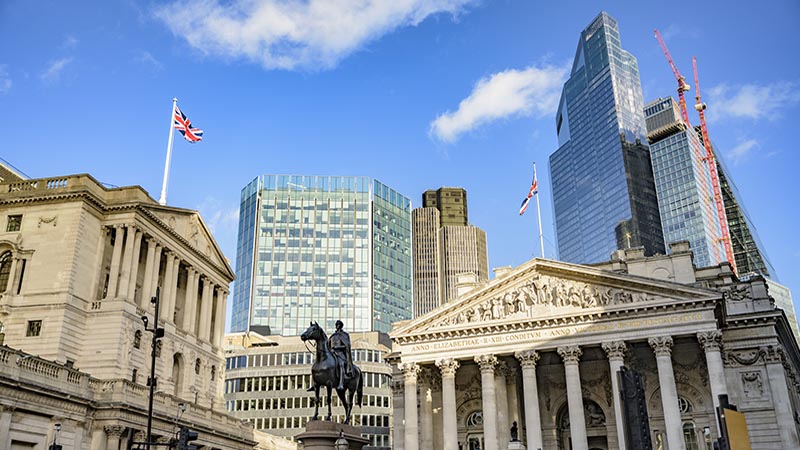UK core inflation remains “stubborn” and suggests that a further 50 basis-point interest rate hike is “not off the table”, according to some industry commentators, who warned that today’s CPI fall to 6.8% is no reason for investors to rest on their laurels.
Data from the Office for National Statistics (ONS) released today (16 August) shows inflation rose by 6.8% over 12 months to the end of July, compared to a 7.9% rise at the end of last month. This came broadly in-line with expectations and marks the lowest rise in inflation since the start of the Russia/Ukraine war in spring 2022.
The fall in the rise of inflation was predominantly driven by the ‘housing, water, electricity, gas and other fuels’ sector, with prices falling from 12% to the end of June to 6.8% to the end of July.
Elsewhere, food and non-alcoholic beverages dipped from 17.3% to 14.8%; clothing and footwear fell from 7.2% to 6.6%; and furniture, household equipment and maintenance fell by 30 basis points to 6.2% over the month.
See also: Capital Economics: Why inflationary ‘economics 101’ has been ‘fatally undermined’
Steve Windsor, co-founder and principal at Atrato Group, said the softening provides “further good news on inflation”, following yesterday’s news that UK food price inflation data was also 2.2% lower.
“Today’s consumer price index (CPI) data relieves some of the pressure on the Bank of England for further rate hikes, and indicates that we may have topped out inflation-wise in this cycle,” he said.
“Investment markets, particularly commercial property markets, will breathe a collective sigh of relief on these lower inflation numbers.”
No room for complacency
However, several investment commentators believe we will see at least one more interest rate hike to attempt to curb inflation.
Neil Birrell, chief investment officer at Premier Miton Investors, said there is “no room for complacency” from the Bank of England, given they were likely hoping for a greater month-on-month improvement in inflation figures.
“We are not yet at the stage in the UK that we can say that we are winning the battle on inflation, there are too many pressures,” he argued. “It looks like interest rates are on their way up again at the next meeting of the Monetary Policy Committee.”
Sekar Indran, senior portfolio manager at Titan Asset Management, went as far as to day that a “50 basis point rate hike is not of the table” at the Bank’s September meeting, given strong wage growth data.
“The next inflation print is due the day before the BoE’s interest rate decision where we could see the headline figure edge up again due to higher fuel prices,” he said.
Saxo UK CEO Charles White Thompson urged the BoE to now tread carefully. While he said the Monetary Policy Committee will now be “mildly pleased with themselves”, he warned there are still several headwinds for the Bank of England to contend with over the medium term.
“At the risk of being a party pooper, we should remember that quarter-on-quarter GDP growth is an anaemic 0.2%, inflation is three times over the target and the consumer is on their knees saddled with debt that was once ‘given away’ cheap,” he warned.
“These numbers need to be built on, as a ‘flash in the pan’ would damage confidence significantly – consistency or stringing together a series of improved numbers is most important.
“To the jigsaw we add an increase in unemployment to 4.2% which shows the employment market is resilient and tight, and wages are running hot as seen in the 7.8% wage growth. This sort of wage growth is inflationary and will have caught the MPC’s eye.”
Loss of confidence in the BoE
White Thompson added that strong UK economic data elsewhere – such as better-than-expected GDP growth and high wages – will “push the Bank of England’s hand” to continue to hike rates by at least a further 25 basis points; a tactic he describes as a “blunt tool” which only “at first glance appears to be working”.
“The Governor has reduced his strategic options with the ‘no ifs, no buts’ messaging and that is why the risk for further policy failure or over tightening is real,” he warned. “Forecasting interest rate hike lag is highly challenging.”
He added: “We need a monetary policy review, with fresh eyes including generalists, to answer how we got here including ‘how to break the cycle of group think’ among the key economic decision makers.”
Oliver Blackbourn, multi-asset portfolio manager at Janus Henderson Investors, said investors are “more sceptical” about the BoE’s ability to bring inflation back to the targeted 2%, than they are of the US Federal Reserve or the European Central Bank.
“UK 10-year breakeven rates continue to price in a larger inflation premium, indicating less confidence in the BoE’s ability to fulfil its mandate,” he explained. “Markets are pricing in roughly two to three hikes over the rest of the year, as concerns remain about how much further the BoE will decide to push to fully defeat inflation.
“However, the BoE is aware that it only has so much time before the tighter financial conditions start to bite more widely in the economy.”
Blackbourn pointed out that mortgage borrowers had locked in at lower rates the year before they began to rise, which he said creates “some breathing room” for them but “still leaves likely intensive transmission of tighter monetary policy to come for mortgage holders”.
He added: “While the BoE is aware of this potential mortgage timebomb, it is caught between its inflation mandate and concerns about causing a harder economic landing.”







